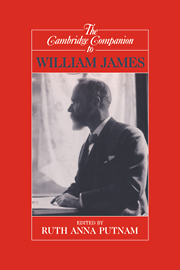Book contents
- Frontmatter
- Introduction
- 1 Pragmatism and introspective psychology
- 2 Consciousness as a pragmatist views it
- 3 John Dewey's naturalization of William James
- 4 James, Clifford, and the scientific conscience
- 5 Religious faith, intellectual responsibility, and romance
- 6 The breathtaking intimacy of the material world
- 7 James, aboutness, and his British critics
- 8 Logical principles and philosophical attitudes
- 9 James's theory of truth
- 10 The James/Royce dispute and the development of Jarnests "solution"
- 11 William James on religious experience
- 12 Interpreting the universe after a social analogy
- 13 Moral philosophy and the development of morality
- 14 Some of life's ideals
- 15 “A shelter of the mind”
- 16 The influence of William James on American culture
- 17 Pragmatism, politics, and the corridor
- 18 James and the Kantian tradition
- Bibliography
- Index
1 - Pragmatism and introspective psychology
Published online by Cambridge University Press: 28 May 2006
- Frontmatter
- Introduction
- 1 Pragmatism and introspective psychology
- 2 Consciousness as a pragmatist views it
- 3 John Dewey's naturalization of William James
- 4 James, Clifford, and the scientific conscience
- 5 Religious faith, intellectual responsibility, and romance
- 6 The breathtaking intimacy of the material world
- 7 James, aboutness, and his British critics
- 8 Logical principles and philosophical attitudes
- 9 James's theory of truth
- 10 The James/Royce dispute and the development of Jarnests "solution"
- 11 William James on religious experience
- 12 Interpreting the universe after a social analogy
- 13 Moral philosophy and the development of morality
- 14 Some of life's ideals
- 15 “A shelter of the mind”
- 16 The influence of William James on American culture
- 17 Pragmatism, politics, and the corridor
- 18 James and the Kantian tradition
- Bibliography
- Index
Summary
The revival of interest in William James seems to result largely from a new fondness for American pragmatism. Given that, we should not be surprised that, for many philosophers presiding at the revival, Dewey and Peirce receive the lion's share of attention. Or that contemporary interest, when focused on James, renews efforts to get his pragmatism straight, since that is admittedly a thorny concept, especially if it is linked with such other Jamesean doctrines as the will-to-believe.
Today's returnees to James are apparently less stimulated by his having been one of the last major introspective psychologists prior to the behaviorist take-over. Why this is so may be elusive, but, for whatever reasons, introspective psychology at its demise seemingly took memories of itself to the grave as well. Those who do occasionally remember are mostly lonely cemetery-walkers talking to themselves for lack of conversational company.
This is regrettable on several counts. A full look at James's work forces one to stare hard and long at the notion of introspection, and, beyond interpreting James, at analyses that the notion deserves. Although the literature is liberally sprinkled with references to the concept, sustained treatments of it are uncommon. William Lyons's excellent contribution of a few years ago, so far as I know, is the only book-length study devoted to introspection. An idea that is knocked about as introspection is ought to be laid out for patient diagnosis, a consequence that we might hope from a Jamesean revival.
- Type
- Chapter
- Information
- The Cambridge Companion to William James , pp. 11 - 24Publisher: Cambridge University PressPrint publication year: 1997
- 5
- Cited by

